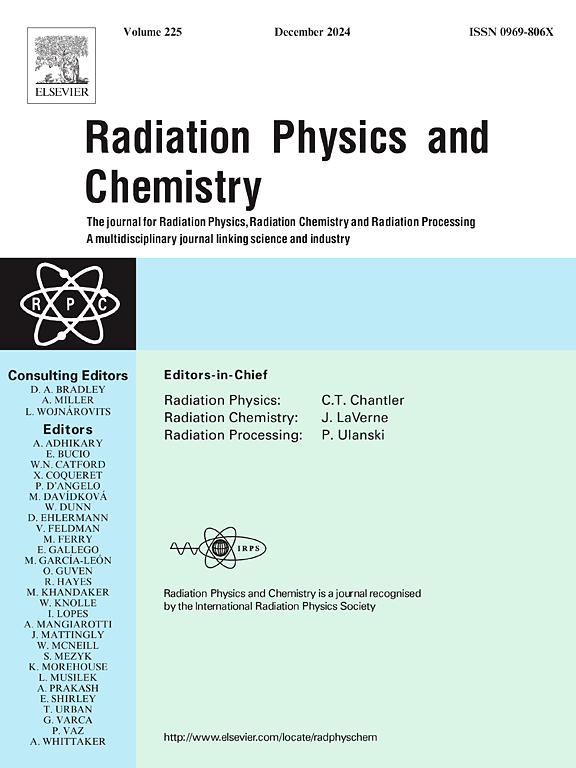Evaluation of the impact of 60Co γ-ray irradiation on aflatoxin abatement and quality attributes in peanut press cake
IF 2.8
3区 物理与天体物理
Q3 CHEMISTRY, PHYSICAL
引用次数: 0
Abstract
This study evaluated the efficacy of γ-ray irradiation on degrading aflatoxins in peanut press cake, considering the effects of initial aflatoxin levels, irradiation doses and moisture content. The results demonstrated that degradation efficiency peaked and subsequently decreased with increasing aflatoxin content, whereas higher irradiation doses and moisture levels both enhanced aflatoxin degradation. Meanwhile, the first-order kinetic model (R2 = 0.9799–0.9954) better described aflatoxin degradation than the second-order model. Irradiation had a modest impact on the nutritional and sensory attributes of peanut press cake. It was suggested that a 10 kGy irradiation dose could ensure product quality and effective decontamination when the initial aflatoxin content is around 137 μg/kg to 145 μg/kg, and the moisture content is approximately 11 %. As a non-thermal processing method, γ-ray irradiation effectively reduces mycotoxin levels with less nutritional loss, operational simplicity, and pollution-free environmental sustainability, offering broad application prospects in thermos-sensitive food safety enhancement.
60Co γ射线辐照对花生压榨饼中黄曲霉毒素抑制及品质影响的评价
本研究考察了γ射线辐照对花生压榨饼中黄曲霉毒素的降解效果,考虑了初始黄曲霉毒素水平、辐照剂量和水分含量的影响。结果表明,随着黄曲霉毒素含量的增加,降解效率达到峰值,随后下降,而较高的辐照剂量和湿度水平均促进了黄曲霉毒素的降解。与此同时,一级动力学模型(R2 = 0.9799 ~ 0.9954)较二级动力学模型更能描述黄曲霉毒素降解。辐照对花生压榨饼的营养和感官特性影响不大。结果表明,在黄曲霉毒素初始含量为137 ~ 145 μg/kg,水分含量约为11%时,10 kGy的辐照剂量可保证产品质量和有效去污。γ射线辐照作为一种非热加工方法,具有营养损失小、操作简单、无公害、环境可持续性等优点,能有效降低霉菌毒素水平,在热敏性食品安全强化方面具有广阔的应用前景。
本文章由计算机程序翻译,如有差异,请以英文原文为准。
求助全文
约1分钟内获得全文
求助全文
来源期刊

Radiation Physics and Chemistry
化学-核科学技术
CiteScore
5.60
自引率
17.20%
发文量
574
审稿时长
12 weeks
期刊介绍:
Radiation Physics and Chemistry is a multidisciplinary journal that provides a medium for publication of substantial and original papers, reviews, and short communications which focus on research and developments involving ionizing radiation in radiation physics, radiation chemistry and radiation processing.
The journal aims to publish papers with significance to an international audience, containing substantial novelty and scientific impact. The Editors reserve the rights to reject, with or without external review, papers that do not meet these criteria. This could include papers that are very similar to previous publications, only with changed target substrates, employed materials, analyzed sites and experimental methods, report results without presenting new insights and/or hypothesis testing, or do not focus on the radiation effects.
 求助内容:
求助内容: 应助结果提醒方式:
应助结果提醒方式:


